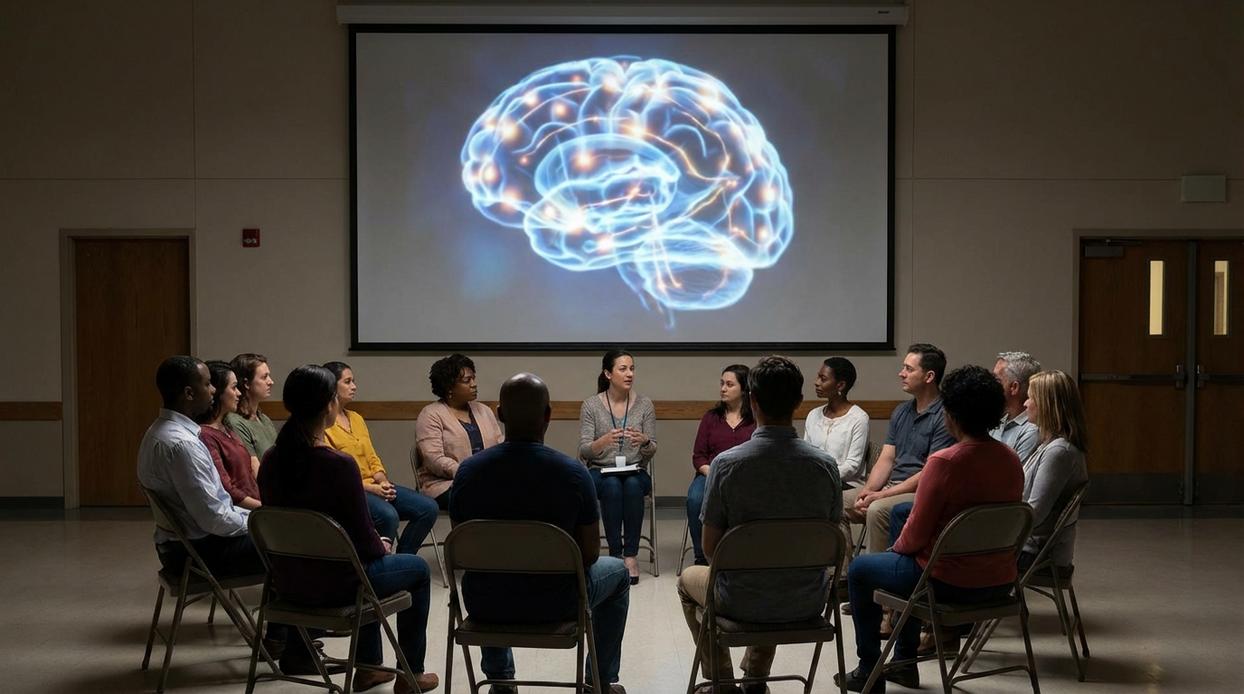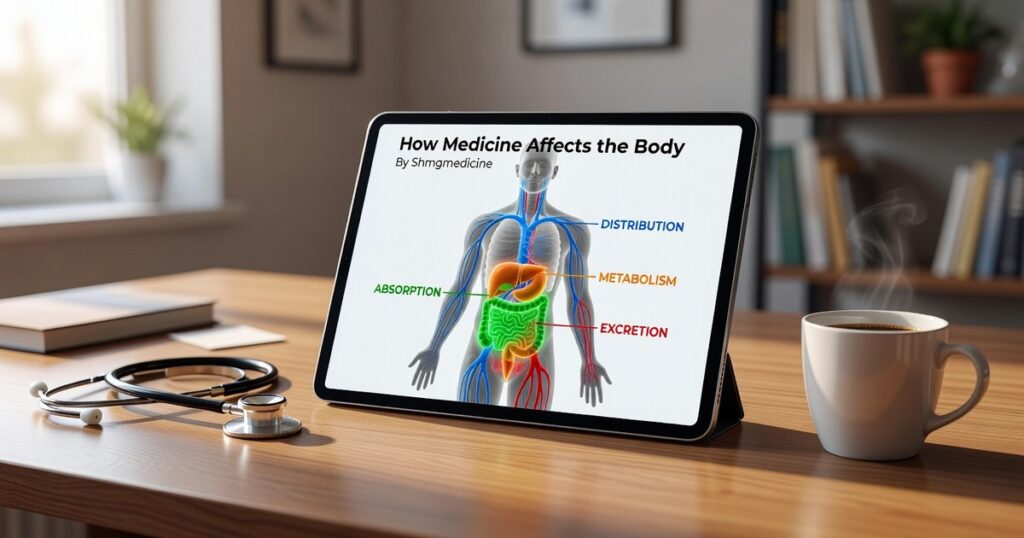I’ve spent years explaining how medicine works to patients who just want straight answers.
You swallow a pill and expect it to fix your headache or lower your blood pressure. But what actually happens between swallowing and feeling better? Most people have no idea.
Here’s the thing: your body treats medicine like a complex obstacle course. The pill has to survive your stomach acid, get absorbed through your intestinal walls, travel through your bloodstream, and somehow find the exact cells it needs to affect.
How medicine affects the body is more complicated than most doctors explain during a quick office visit.
I’m going to walk you through the real journey. From the moment a pill hits your tongue to when your body finally eliminates it hours or days later.
We consulted pharmacologists and reviewed clinical research to make sure this explanation is accurate. No medical jargon that makes your eyes glaze over. Just clear explanations of what’s happening inside you.
You’ll understand why some medications need food and others don’t. Why timing matters. Why side effects happen even when the medicine is working exactly as designed.
This isn’t about scaring you away from medication. It’s about knowing what’s happening in your own body so you can take medicine smarter.
Step 1: The Entry Point – How Medicine Gets Into Your System
You pop a pill and expect it to work.
But what actually happens between swallowing and feeling better?
Most people think medicine just dissolves and spreads through your body. That’s not quite right. Your body has to process that drug first, and how it gets in matters more than you’d think.
I’m going to walk you through the entry point. This is where everything starts.
Your body has options for taking in medicine.
Swallow a pill and it travels through your stomach. Get an injection and it goes straight into your bloodstream or muscle. Rub on a cream and it absorbs through your skin.
Each route changes how fast the drug works and how strong the effect feels. An injection hits faster because it skips your digestive system. A pill takes longer but it’s easier to take at home.
Here’s where it gets interesting.
When you take medicine orally, your liver gets first dibs. Before that drug reaches the rest of your body, it passes through your liver for processing. We call this the first pass effect.
Your liver breaks down some of the active drug right away. Sometimes it reduces the concentration by 30% or more before the medicine even starts working where you need it (this is why some medications require higher oral doses than injectable ones).
Some people say this makes oral medication less effective, so you should always choose injections when possible. But that’s oversimplifying it. Oral medication works fine for most conditions. The dosing already accounts for first pass metabolism.
What you eat matters too.
Taking certain medications with food can slow absorption. Others actually need food to work properly. Your gut health plays a role as well. If you’re dealing with digestive issues, you might not absorb medication as efficiently as someone with a healthy gut.
Other medications can interfere. Some drugs speed up absorption while others slow it down. This is why your doctor asks what else you’re taking.
Here’s what I recommend you do.
Always take medication exactly as prescribed. If the label says take with food, do it. If it says on an empty stomach, wait to eat.
Keep a list of everything you take, including supplements. Show it to your doctor or pharmacist. They can spot potential absorption issues before they become problems.
If a medication isn’t working as expected, don’t just assume it’s not right for you. Talk to your healthcare provider about absorption factors. Maybe timing or food is affecting how medicine affects the body shmgmedicine in your specific case.
Pay attention to your gut health. Probiotics, fiber, and staying hydrated all support better absorption.
The entry point sets everything else in motion. Get this part right and you’re already ahead.
Step 2: The Main Event – How Medicine Creates Change
So you’ve swallowed a pill and it’s made its way through your system.
Now what?
This is where things get interesting. This is pharmacodynamics, which is just a fancy way of saying “what the drug does to your body.”
Think of it like this. Your cells have tiny locks on their surface called receptors. Medicine acts like a key that fits into these locks.
Some drugs turn the lock and open the door. We call these agonists. They trigger an action. Your migraine medication binds to serotonin receptors and tells your blood vessels to stop swelling.
Other drugs just block the keyhole so nothing else can get in. These are antagonists. Antihistamines work this way. They sit in histamine receptors and prevent the allergic reaction from starting.
But not all medicine targets receptors.
Some go after enzymes instead. Take ibuprofen. It blocks an enzyme called COX that creates inflammation signals. No enzyme activity means less pain and swelling.
Other medications mess with cellular channels. Blood pressure drugs can open calcium channels in your blood vessel walls. This lets the vessels relax and your pressure drops.
Here’s what most people don’t realize though.
The amount you take matters MORE than you think.
This is the dose-response relationship. Too little and nothing happens. The right amount and you get relief. Too much and you’re in trouble.
We call that sweet spot the therapeutic window. It’s where how medicine affects the body shmgmedicine becomes helpful instead of harmful.
Your doctor calculates this window based on your weight, age, and other medications you take. It’s why you can’t just double up when one pill doesn’t work fast enough.
The difference between medicine and poison? Often just the dose.
Step 3: The Cleanup Crew – Processing and Removing the Medicine

Your liver doesn’t get enough credit.
Right now, it’s working through everything you’ve put in your body today. That morning coffee. Your medication. Even that energy drink you grabbed at lunch.
Think of your liver as a processing plant that never sleeps. It takes drug molecules and breaks them down into smaller pieces. Pieces your body can actually get rid of.
This is metabolism. And it happens mostly in your liver cells, where enzymes grab onto drug compounds and tear them apart.
Some people say you don’t need to worry about this stuff. Just take your pills and trust the process. But understanding how medicine affects the body shmgmedicine changes how you think about dosing and timing.
Here’s what actually happens.
Your liver transforms drugs into metabolites (that’s just a fancy word for broken-down pieces). Some metabolites are still active. Others are completely inert. Most are water-soluble, which means your kidneys can filter them out.
And that’s where your kidneys come in.
They act like a screening system. Blood flows through tiny filters called nephrons. These filters catch the metabolites and push them into your urine. Gone.
You also lose tiny amounts through sweat (you can sometimes SMELL certain medications coming through your skin). Through your breath. Through saliva. But urine does most of the heavy lifting.
Now here’s the part that matters for your daily life.
Every drug has a half-life. That’s the time it takes for half the drug to leave your system. If a medication has a four-hour half-life, half of it is gone in four hours. Half of what’s left disappears in another four hours.
This is why some pills are once daily and others are every four hours. It’s all about keeping enough medicine in your blood without letting it build up to dangerous levels.
Beyond the Target: Understanding Side Effects and Individual Differences
Here’s something most people don’t realize about medication.
Your body doesn’t read the label.
When you take a pill, the active ingredient doesn’t just go straight to where it’s needed and stop there. It travels through your bloodstream and touches receptors all over your body.
Some of those receptors? They weren’t the target at all.
Why Side Effects Happen
Think about it like this. A drug designed to block pain receptors in your back might also block similar receptors in your gut. That’s why pain meds can cause constipation.
The medicine is doing exactly what it’s supposed to do. It’s just doing it in places you didn’t want.
This is how medicine affects the body shmgmedicine explains in most pharmacology basics. Few drugs are perfectly targeted. Most bind to multiple receptor types because the body uses similar chemical structures in different places.
Your Genes Matter More Than You Think
Now here’s where it gets interesting.
Two people can take the same dose of the same drug and have completely different experiences. One feels better in hours. The other gets side effects and barely any relief.
Why? Genetics.
Your DNA determines how fast your liver breaks down certain medications. Some people are what we call “fast metabolizers.” They clear drugs quickly and might need higher doses. Others are slow metabolizers who need less or risk buildup in their system.
This field is called pharmacogenomics. And it’s changing how we think about dosing.
Other Factors That Change Everything
Age plays a role too. Kids and older adults process medications differently than healthy adults in their 30s.
Weight matters because it affects drug concentration in your blood. A 120-pound person will have different levels than someone who’s 220 pounds on the same dose.
Even what you ate for breakfast can change how well you absorb certain medications. Grapefruit juice famously interferes with dozens of common drugs.
Your overall health status? That’s another variable. Kidney or liver problems mean your body can’t clear medications as efficiently.
Pro tip: Keep a simple log of how you respond to new medications. Note the time you took it, what you ate, and any effects. This info helps your doctor adjust your treatment.
The takeaway here is simple. Medicine isn’t one-size-fits-all. Your response depends on your unique biology and circumstances.
Becoming an Empowered Partner in Your Health
You now have a clear map of medicine’s journey through the body.
From entry and action to its eventual exit, you understand how medicine affects the body shmgmedicine.
This knowledge transforms medicine from a mystery into something predictable. It’s science you can work with.
When you understand these processes, you can better follow your treatment plan. You’ll know why timing matters and what to expect when side effects show up.
Here’s what to do with this information: Start asking better questions at your next appointment. Talk to your doctor or pharmacist about how your medications work in your body. Become an active participant instead of a passive patient.
You came here to understand what happens when you take medicine. Now you have that understanding.
Use it to take control of your healthcare decisions. The more you know, the better choices you’ll make.
Your health is too important to leave in someone else’s hands alone.



